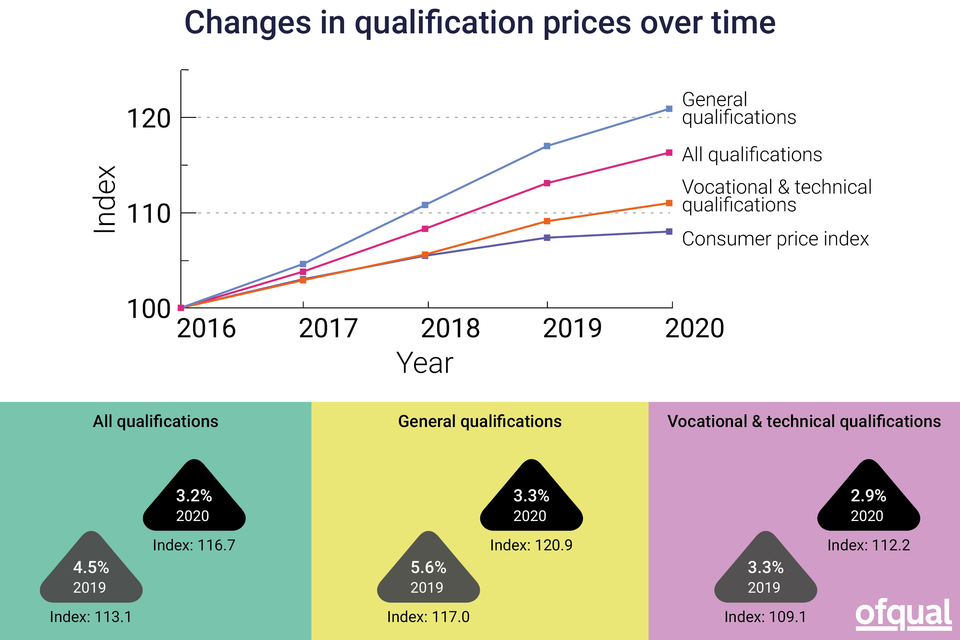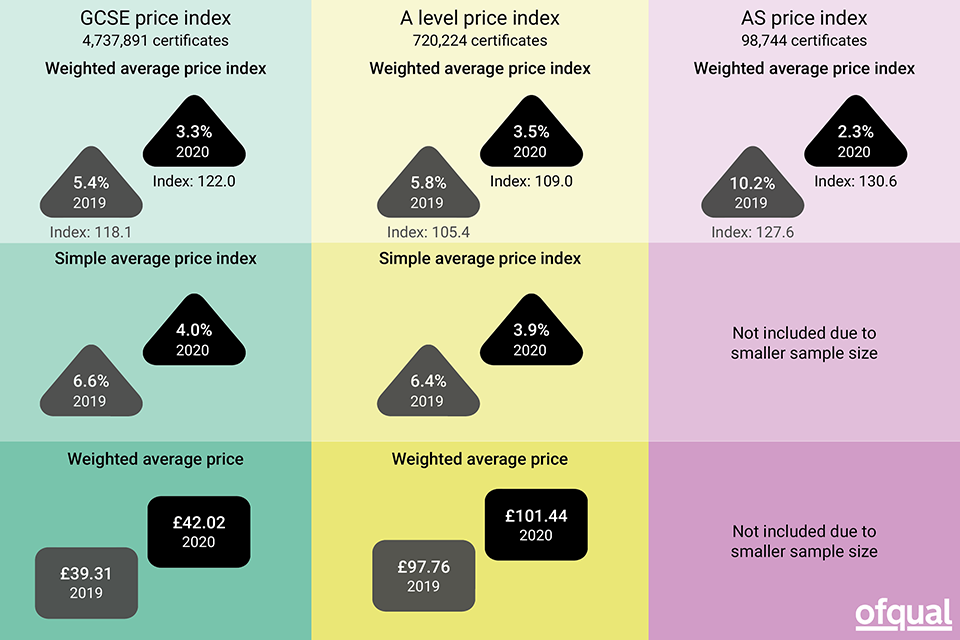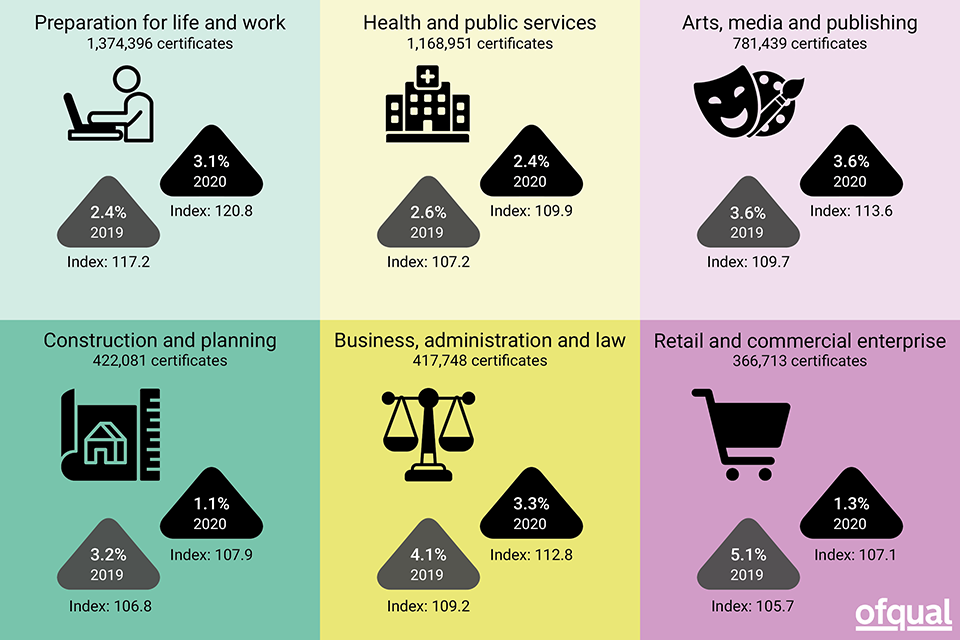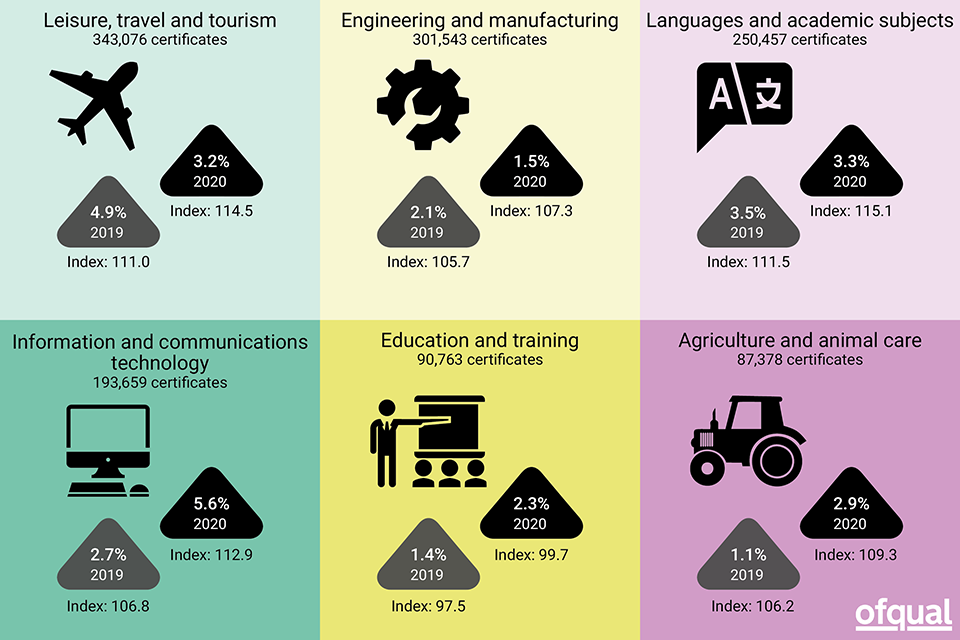Qualifications price index 2020
Published 11 February 2021
Applies to England
Introduction and key findings
For this year’s qualification price index we analysed changes to the published prices of regulated qualifications in England between 2019 and 2020. We analysed these prices as if examinations and other qualification assessments had gone ahead as normal. This is so that we can continue to track the prices within the sector, year-on-year. Last year’s report is available on our website.
The accompanying report, ‘Qualification price index: supplementary analysis for 2020’ captures the different awarding organisations and centre activities related to the delivery of qualifications in 2020. It gives details on new and saved costs in the sector and includes information about the qualification fee rebates provided to centres.
Between 2019 and 2020, the overall price of all qualifications increased by 3.2%
This is a smaller proportional increase compared with qualifications prices between 2018 and 2019 which rose by 4.5%. From 2019 to 2020, vocational and technical qualifications increased by 2.9%, and general qualifications increased by 3.3%, using weighted averages. Over the same period the consumer price index increased at a slower rate.

Qualification prices have risen between 2019 and 2020, but at a slower rate than the previous year.
General qualification price analysis

The weighted average prices for GCSEs, and A levels increased in 2020. 3.3% for GCSEs, 3.5% for A levels. AS increased by 2.3%. For full data see the section 'Data for included charts and graphs'.
General qualifications (GCSE, AS and A level) commentary
The general qualifications market underwent substantial disruption in 2020 due to the coronavirus (COVID-19) pandemic. See our ‘Qualification price index: supplementary analysis for 2020’ report for more detail, including information about the qualification fee rebates provided to centres. Here we present analysis of 2020 qualification prices as if examinations and other qualification assessments had gone ahead as normal.
A level prices
The weighted average price for an A level in 2020 was £101.44
The weighted average price for A level qualifications increased by 3.5% from 2019 to 2020. The simple average price increased marginally more over the same period (3.9%).
GCSE prices
The weighted average price for a GCSE in 2020 was £42.02
The weighted average price for GCSE qualifications increased by 3.3% from 2019 to 2020. The simple average price increased marginally more over the same period (4.0%).
AS prices
The weighted average price for AS qualifications increased by 2.3% from 2019 to 2020. The number of AS certificates awarded in 2018 to 2019 (98,744 certificates) is significantly reduced from 2017 to 2018 (236,175 certificates), due to AS qualification reform. Due to the reduced number of certificates in 2018 to 2019, and a smaller sample of qualifications, we do not include further price analysis for AS qualifications as this is less representative.
Vocational and technical qualifications price analysis

Prices for the top 6 most popular vocational qualifications increased in 2020. The biggest increase was preparation for life and work at 3.1%. For full data see the section 'Data for included charts and graphs'.

Prices for the next 6 most popular vocational qualifications increased in 2020. The biggest increase in the top 12 qualifications was information and communications technology at 5.6%. For full data see the section 'Data for included charts and graphs'.
Vocational and technical qualifications commentary
The vocational and technical qualifications market underwent substantial disruption in 2020 due to the coronavirus (COVID-19) pandemic. See our ‘Qualification price index: supplementary analysis for 2020’ report for more detail, including information about the qualification fee rebates provided to centres. Here we present analysis of 2020 qualification prices as if examinations and other qualification assessments had gone ahead as normal.
Vocational and technical subject areas
We analysed 12 subject area groupings within the sector. The subject area of information and communications technology shows the largest percentage increase in qualification price between 2019 and 2020 (5.6%). The subject area of construction and planning has the smallest percentage increase in qualification price during this period (1.1%).
Methodology
We calculated qualification price changes by using representative baskets of qualifications.
General qualification basket
The basket of general qualifications includes all qualifications with a 1,000 or more certificates in England for 2018 to 2019. The 207 qualifications account for 99% of all general qualifications certificates issued. Prices for 2020 are applicable to the 2019 to 2020 academic year, which covers November 2019 re-takes and the cancelled summer 2020 examinations.
Vocational and technical qualification basket
The basket of vocational and technical qualifications includes a sample of 212 qualifications, covering 35% of vocational and technical qualification certificates issued in 2018 to 2019.
We continued our approach from 2019 where we used both a database of all qualifications funded by the Education and Skills Funding Agency (ESFA) and certificates data to construct a sample which represents the current market. The vocational and technical qualifications in the sample cover all subject area groupings included from last year, and includes a range of qualification types.
For 2020 we abbreviate the analysis in the report and do not include price changes for different qualification levels within the subject areas. This streamlines our analysis and reduces statistical concerns about small sample sizes. For the 2021 qualification price index we will evolve our methodology to use newly published awarding organisation information based on our revised general condition F1.
Technical notes
- All indices began at 100 in 2016.
- The simple average price changes are the average of all qualification price increases, irrespective of certificate volumes.
- Changes in weighted averages are based on prior year volumes.
- For information we include certificate numbers for the full relevant market from the academic year 2018 to 2019.
- The product diversity within the vocational and technical qualifications market makes a simple average price index less representative than for the more uniform general qualifications market, hence we do not include in this report.
- General qualifications include GCSE, AS and A level.
- Vocational and technical qualifications subject area groupings are based on categories from the Ofqual Register of Regulated Qualifications.
Data for included charts and graphs
Qualification price index from 2016 to 2020
| Series | 2016 | 2017 | 2018 | 2019 | 2020 |
|---|---|---|---|---|---|
| All qualifications | 100.0 | 103.8 | 108.3 | 113.1 | 116.7 |
| General qualifications | 100.0 | 104.6 | 110.8 | 117.0 | 120.9 |
| Vocational & technical qualifications | 100.0 | 102.9 | 105.6 | 109.1 | 112.2 |
| Consumer price index | 100.0 | 103.0 | 105.5 | 107.4 | 108.0 |
Weighted average price index: overview
| Series | 2019 % increase | 2019 index | 2020 % increase | 2020 index |
|---|---|---|---|---|
| All qualifications | 4.5% | 113.1 | 3.2% | 116.7 |
| General qualifications | 5.6% | 117.0 | 3.3% | 120.9 |
| Vocational & technical qualifications | 3.3% | 109.1 | 2.9% | 112.2 |
Weighted average price index: general qualifications
| Series | 2019 % increase | 2019 index | 2020 % increase | 2020 index |
|---|---|---|---|---|
| GCSE | 5.4% | 118.1 | 3.3% | 122.0 |
| A level | 5.8% | 105.4 | 3.5% | 109.0 |
| AS | 10.2% | 127.6 | 2.3% | 130.6 |
Simple average price index: general qualifications
| Series | 2019 % increase | 2020 % increase |
|---|---|---|
| GCSE | 6.6% | 4.0% |
| A level | 6.4% | 3.9% |
Weighted average price: general qualifications
| Series | 2019 price | 2020 price |
|---|---|---|
| GCSE | £39.31 | £42.02 |
| A level | £97.76 | £101.44 |
Weighted average price index: vocational and technical qualifications
| Subject area | 2019 % increase | 2019 index | 2020 % increase | 2020 index |
|---|---|---|---|---|
| Preparation for life & work | 2.4% | 117.2 | 3.1% | 120.8 |
| Health & public services | 2.6% | 107.2 | 2.4% | 109.9 |
| Arts, media & publishing | 3.6% | 109.7 | 3.6% | 113.6 |
| Construction & planning | 3.2% | 106.8 | 1.1% | 107.9 |
| Business, administration & law | 4.1% | 109.2 | 3.3% | 112.8 |
| Retail & commercial enterprise | 5.1% | 105.7 | 1.3% | 107.1 |
| Leisure, travel & tourism | 4.9% | 111.0 | 3.2% | 114.5 |
| Engineering & manufacturing | 2.1% | 105.7 | 1.5% | 107.3 |
| Languages & academic subjects | 3.5% | 111.5 | 3.3% | 115.1 |
| Information & communications technology | 2.7% | 106.8 | 5.6% | 112.9 |
| Education & training | 1.4% | 97.5 | 2.3% | 99.7 |
| Agriculture & animal care | 1.1% | 106.2 | 2.9% | 109.3 |

